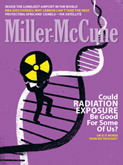In Nigeria, an Islamic sect called Boko Haram — a name that roughly translates into “Western education is a sin” — is waging war against Christians in the country’s Muslim north, resulting in the deaths of hundreds. The group has stated that it intends to target hotels and restaurants frequented by foreigners for its attacks. In the country’s south, Christian militants continue to fight against the government and foreign oil companies. And kidnappings of Western businesspeople are common.
Yet Nigeria is the largest oil producer in Africa and has many untapped reserves. Its agriculture industry grew nearly 9 percent in 2010. And Nigeria’s gross domestic product grew by more than 8 percent in 2010.
This figure could be even higher if not for the country’s shaky security situation.
Even getting from the airport in Lagos — the country’s largest city — to the city center is fraught with disorder and danger. A trip to the airport that takes half an hour without traffic can take four hours on a busy weekday. In Port Harcourt, the largest city in the oil-rich Niger Delta, foreigners take helicopters from the airport to their companies’ fortified headquarters or travel in large security convoys — for both speed and safety. In Abuja, the capital of Nigeria, large sections of the highways simply aren’t finished.
The government, along with a consortium of companies, has come up with an idea to solve the problem: bring the city to the airport.
The proposed Minna Airport City, which will be situated in a volatile region about 90 miles northwest of Abuja, is being billed by its developers and politicians as Nigeria’s Dubai. The vision: build two runways that cross diagonally, place a control tower in the center, and then build the city in the area between the runways. The city-between-runways would include hotels, shops, a conference center, and a hospital and a manufacturing district. Security forces would ring the entire city.
According to Mu’azu Babangida Aliyu, the governor of Niger State where the airport would be located, Minna Airport City has the power to change damaging perceptions of Nigeria.
The March-April 2012
Miller-McCune
This article appears in our March-April 2012 issue under the title “Nigeria’s Airport Dreams” To see a schedule of when more articles from this issue will appear on Miller-McCune.com, please visit the
March-April magazine page.

“What you read about Nigeria must be a negative: corruption, insecurity,” Aliyu says. “Why not change the face and perception of Nigeria from negative to positive, and why not bring people who can help us.”
These partners include Maevis Limited, a Nigerian company that promotes travel in sub-Saharan Africa, as well as architects Sheppard Robson; Arup, a global consultancy; and the international construction consultancy Davis Langdon.
According to developers, Minna Airport City would, first, provide a safe area for foreign businesses, including foreign workers and their families. And it would spur development.
Companies like Royal Dutch Shell have established fortified compounds throughout the Niger Delta, yet kidnapping still occurs there almost daily. According to Richard Downie, deputy director and fellow with the Center for Strategic and International Studies’ Africa Program, “Boko Haram [has shown its] ability to strike protected Western targets in Abuja. Building this project in [Nigeria’s] north makes it a potential target.”
Downie added that building a safe haven for foreigners and then hoping the wealth will trickle down to Nigerians is an approach that has failed miserably elsewhere in the country. The Delta is littered with the skeletons of long-abandoned international development projects.
Will Minna Airport City suffer a similar fate?
Tunde Fagbemi, managing director of Maevis Limited, recently announced that the company had just about secured the first round of financing. He also received a commitment from Chinese manufacturers to produce goods at the airport city. Maevis also has started an advertising campaign promoting the city to foreigners (I first learned of the project from an advertisement on the back of an Ethiopian Airlines boarding pass). Once the Nigerian government approves the creation of the free trade zone in the area where Minna Airport City will be located, the project can move forward.
Maybe, for once in Nigeria, business and economics and politics will come together, and the airport city will succeed. But when I was there, I found that Nigerians had adopted into their lexicon the title of author Chinua Achebe’s most celebrated work, Things Fall Apart, as a catchall for projects just like this one. Achebe, of course, had looked to Yeats:
“Things fall apart; the centre cannot hold;
Mere anarchy is loosed upon the world,
The blood-dimmed tide is loosed, and everywhere
The ceremony of innocence is drowned;
The best lack all conviction, while the worst
Are full of passionate intensity.”
Sign up for the free Miller-McCune.com e-newsletter.


